|
|

|
|
Chapter 7: In which Mongy learns about a few secrets of the Amazon By Christa Maas Prologue The driver of the jeep cursed loudly while driving through the pouring rain. He was a heavyset man with a hard, weathered face which seemed to twist into an ugly grin whenever he tried to smile. His father had been a well known, dedicated biologist and an expert in reptiles. Pedro had followed in his footsteps without his father's love for animals and he quickly discovered how to make money by selling them to rich collectors and people who wanted exotic pets. At the moment he was carrying a precious load of exotic amphibians in the back of the jeep, and he cursed when he remembered that he had forgotten to feed them- again. He stopped at a place where the jungle canopy was dense enough for him not to get completely soaked and opened the first container. He looked at the frogs disgustedly, through in some food without great care and started to close the box when the cry of a wild bird startled him and he dropped it. The lid did not come completely open, but some of the frogs tried to get out of their prison. He quickly reached down, snapped the lid shut, placed the container back in the jeep and went on to feed the others. "You better not die!" he snickered while getting back into the driver seat "You'll bring me enough money to get by for a while!" The box of frogs was valuable because it contained Red Eyed Tree Frogs, the most beautiful amphibians in existence with their stunningly red eyes, orange toe pads and yellow and blue stripes along the sides of their bodies. "A thing of exotic beauty for my clients and wealth for my pockets" pondered Pedro as the jeep continued towards it's destination and towards and uncertain future for all prisoners on board. But, unnoticed by Pedro, a tiny little egg had fallen out while the frog had been trying to get out of the box. This tiny little egg landed on a leaf, which in turn was carried away by the water, all the way to a riverbed. And so, Mongy the Bay Frog, a red-eyed tree frog was born, in the middle of the Amazon rainforest- a long way from his natural home. Two Years Later "CHRISSSSSSTA, wake up!" whispered Mongy all excited. "We have arrived in Manaus." I am almost home!" For Mongy, Manaus a city in the heart of the Amazon Rainforest was home. Mongy remembered he had gone to Manaus when he was young. Manaus, the capital of the Brazilian state Amazonia, had an airport where he somehow ended up on a plane and was flown to São Paulo. He then hid in a small rain forest area near the capital and that's where he hopped onto my jeep, into my backpack and our friendship began. He must have been very young though, because he didn't remember much about his home. He knew that it had a lot of trees, was located somewhere near Manaus in the Brazilian part of the Amazon and hoped to remember more while there. I thought finding Mongy's home was rather like trying to find a needle in a haystack. Sixty percent of the Amazon’s 3.6 million square kilometers (2.2 million miles) is in Brazil. But, not matter how impossible it seemed, I kept my thoughts to myself. "OK, Mongy. We're here!" said Rhett " Tomorrow you'll take a boat along the Rio Negro (the black river) and then maybe you'll remember something else." "Aren't you going with us," Mongy asked Rhett rather surprised. "I'll meet you at the last boat dock. I've met a few guys who are riding there by horse. It's more fun". Rhett replied. 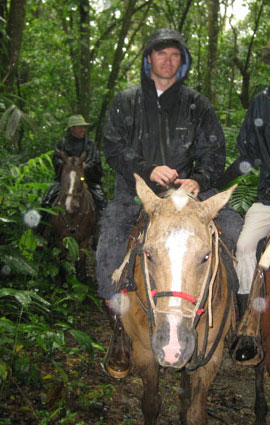 "Hahaha," laughed Mongy, bouncing all over the place. "a bumpy horse ride rather than a smooth and relaxing boat trip. Sounds just like you, Rhett!" That night, Mongy and I did some research about legends of the Amazon. We learned about the legendary "Gold of the Incas" which the Incas have supposedly hidden somewhere in the Amazon when fleeing from the Spanish invaders and of the legendary city "Paititi" or "El Dorado". "You see, Mongy, every legend has some truth to it. The Incas thought the Spaniards were gods, and they gave them gold to honor them. They had a custom where they covered a new tribal leader first with mud and then gold dust and placed him on a raft. When he reached the middle of the lake, he would wash off the gold as a gift to the gods. "El Dorado" (the golden one) was the legend of a "golden or gilded man", but somehow it turned into the legend of a golden city." "Oh, I looooove lost cities" replied Mongy. 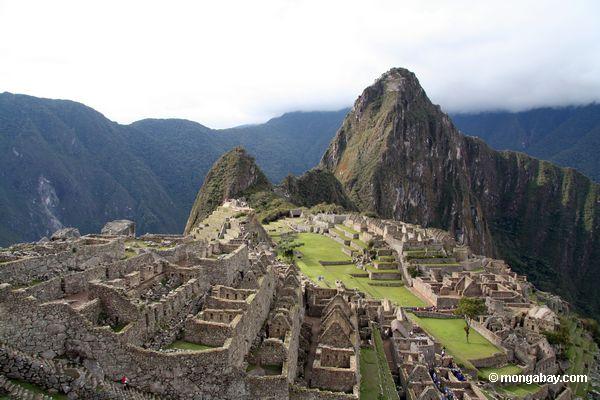 The once lost city of Machu Pichu in Peru "Well, Mongy, you are not the only one. Most scientists think the Incas gave away all the gold they owned had to the Spaniards, but even today, treasure hunters are still looking for a city of gold. You know the Amazon is so dense, there are still undiscovered Indian tribes, and no one has ever seen them or made contact. They are invisible! The Indians we know use medicinal plants we don't even know exist and they protect there hunting grounds, too. They map all these places and the government and non-profit organizations are trying to making sure the Indians and their secrets stay safe. In the past, pharmaceutical companies have stolen some of these secrets and used them to make a lot of money. It's called bio piracy. "Pirates? "sighed Mongy, who remembered his ordeal in Borneo " I don't like pirates- or smugglers! Are there any animal legends?" I smiled at his attempt to change the subject. "Yes, of course there are. The Amazon Indians tell a story about a giant snake that lives in the deepest part of the river and can take on the shape of other beings or even boats. Of course, real giant snakes actually exist. They are called "Anaconda" and can easily be 10 meters (thirty feet) long. They kill their victims by strangling them to death and the river people are really afraid of them.  Anaconda "Killer snakes, Bio pirates, invisible Indians" Mongy shuddered. "I already know about the hunting ground of the invisible two-headed jaguars. It's all soooooo scrary!" But, I know that Mongy loves scary things. "Do you know that the Amazon River used to have a different name? Actually, it has had several names, of which the most known one was Rio Marañon. Today, there is still a state in Brazil called Maranhão. Then around 1550, a Spanish adventurer named Francisco de Orellana got into trouble with one of the Tupuya Indian tribes. In this tribe, men and women fought together and Orellana confused them with the women warriors of Greek mythology and called them Amazons. "What's me-to-lo- gee?" asked Mongy "Mythology, Mongy. It's something people believe might have been but no one can prove." I answered. "You mean like a legend?" asked Mongy. I nodded. "Yes, it's similar." "So, what was the Spanish man doing there?" asked Mongy. "Can you guess what he was doing, Mongy?" Mongy thought and thought. Finally, he jumped up and down and started a sing-song: "He was looking for El Dorado, he was looking for El Dorado," he quaked triumphantly. "Did you know that the Amazon River is one of the longest and also the strongest rivers in the world?" I said. 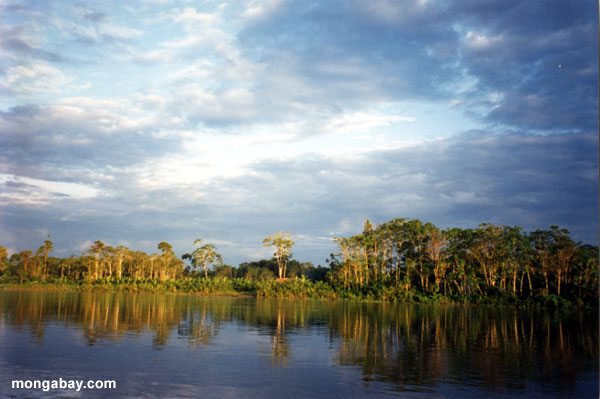 "Maybe the legend of the giant snake is not a legend at all. Maybe the snake is the river! You said that there was a bit of truth to every legend!" Mongy was all excited about this idea. "Well Mongy, tomorrow you will see for yourself. It's time to go to bed now." "Oh, I am soooo excited! I couldn't possibly sleep!" replied Mongy. But he knows how grouchy I get when I don't sleep and so he reluctantly hopped off into the bathroom. The next day Mongy was nestled comfortably under my straw hat again, still afraid of crocodiles, as we boarded a river boat and headed down the Rio Negro. Dolphins could be seen racing along in the keel water of the boat as it tuckered along the wide and beautiful river. About 10 kilometers from Manaus, the captain alerted us to the "meeting of the waters". 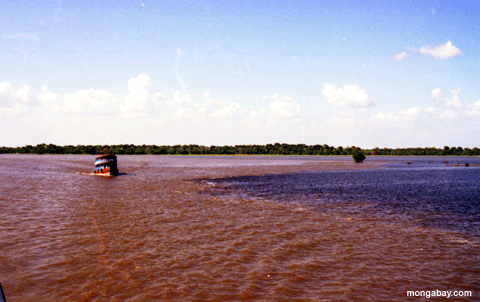 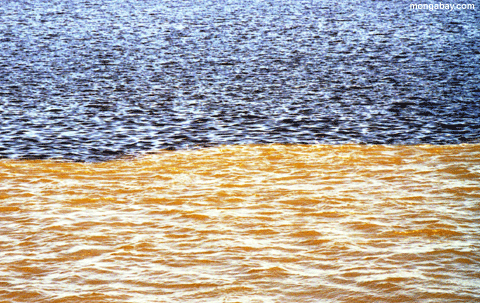 "Meeting of the Waters" near Manaus "Look, Mongy. I said, "the dark water of the Rio Negro is starting to flow together with the muddy water of the Solomon river. Look how the waters run parallel to each other without mixing and without changing color. The captain says this goes on for six kilometers and it happens because there is a difference in temperature and speed of each river. Wow, It's really spectacular!" 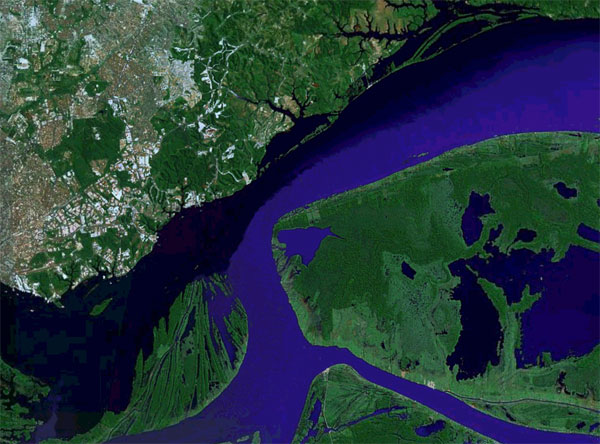 A satellite view of the "Meeting of the Waters" "Crocodiles can't swim in fast moving water." added Mongy. "Are we going ashore soon? " "Yes, Mongy. I thought that maybe the river would trigger your memory. Rhett should be meeting us soon and then we will hike into the jungle and then you can see if you remember anything at all." We anchored at a small boating dock in on of the last outposts in the heart of the jungle. Rhett was already there, smiling from ear to ear and not one bit tired. "Are you ready for a lovely hike?" he asked enthusiastically. I love to be outdoors, but the jungle is hard. It is humid, hot and after a few minutes you feel sticky and hot as well. Rhett on the other hand loved it. He was happiest and crawling through the dense vegetation, taking remarkably beautiful photos of animals and trying to show the world the beauty of the jungle. But he also documents the destruction and was usually very sad in doing so. We had been on the move for about three hours when Mongy, who was perched comfortably on my shoulder suddenly cried out "Oh, no! Now we in big trouble!" I looked ahead and saw that we had reached a real obstacle. The topography had changed and their was a huge rock wall looming over us. Rhett smiled cheerfully . "No problem. I'll go first and then I'll help you and Mongy up, o.k."  Even for Rhett, who is an excellent climber, this was strenuous. But we soon managed to reach the top and continued our hike into the jungle. "I don't see my home yet.." repeated Mongy over and over. We watched monkeys and birds and at night slept in a hammock under a tree. Mongy found a little pond and a nice leaf as well. "Christa, look I sleep just like you and Rhett do" he said. "Yeah, but you eat the mosquitoes, while they are eating me! I need a nice and warm shower and a decent bed." "It would be so perfect if only I could remember something!" sighed our little friend. The next morning, I woke up with a start. Just above my head there was a creature hanging in a tree. "Good morning! Are you hanging out, too?" said the creature "To what do I owe the pleazzzure of your company under my tree?" "Oh, I hope we are not disturbing you?" trying not to notice the creatures lisp. "No, of courzze not." he replied. "my name izz Choloepus Hoffmani, but you can call me Zzlowpoke and I am a slozz."  "You mean a sloth?" I asked puzzled. "Thatzz what I zzaid." Mongy hopped over and landed on my chest, looking up at Slowpoke. "What's a sloth?" he wondered. Then he hopped over to Rhett's hammock, positioned himself on his forearm and asked again "What are slotheses?" "Sloths," corrected Rhett. But he was awake now and soon started to tell Mongy everything he knew about this charming creature. "Sloths do everything, eating, sleeping, mating, and even have babies upside down. They sleep 20 hours a day and their metabolism is so slow, that they move really slowly. The name "sloth" means lazy or slow. It takes 8 days for food to pass through their digestive system, so they don't have to pass feces or urinate but once a week, usually at the bottom of the tree. In comparison, the human digestive system only takes 8 hours. Sloths like to be alone. Females have only one offspring at a time after 8-12 months of gestation and watch their young ones closely. The offspring leaves the mother after 3 months. Sloths like Slowpoke range from Nicaragua south to Peru and Central Brazil. Their long, slender legs are a little longer than their arms and their face is flat with a protruding nose. They are about the size of a cat and grayish brown in color, although algae can grow on their hair and make them look green. They always hang upside down in trees and can easily be mistaken for bunches of dried leaves. They eat leaves, shoots, blossoms and fruit. Slowpoke is part of a family called "Edentata" which means "without teeth. But that is not really correct, because sloths do have molars, or chewing teeth, but they have no roots and continue to grow all their lives. Armadillos and Anteaters belong to the same family, and the toothless anteater gave the family its name. Slowpoke is known as a Hoffmani sloth or a two-toad sloth. The toes are really claws, and are used to cling to trees or for defense. There are also three-toad sloths and a species called maned sloths, which is sadly almost extinct. Sometimes we never get a chance to really study a species before we destroy its habitat" concluded Rhett thoughtfully.  Slowpoke continued. "Have you heard of the legend of the Mapinguari? It is a mystical beast and the Canamari Indians from Rondonia believe it still exists. It is a relative of the giant sloth that lived 8700 years ago. Mapinguari is supposed to be huge- almost 2 meters ( 6 feet) and he cries like a human. Many scientists have tried to find him and many rubber tappers have confused his cries in the jungle with those of a person. They say that he becomes very aggressive when someone invades his habitat and he is so stinky, humans can't stand it. According to the legend, Mapinguari was a shaman, or a witch doctor, who wanted to live forever and was transformed into a monster." "Monsters!" yelled Mongy breathlessly. "Slowpoke, have you seen any invisible Indians, invisible tow-headed jaguars or invisible giant snakes?" "No, Mongy. I haven't. Thatzz why zzey are called invizzable!" "Wait a minute! " I interrupted. "Slowpoke you just called him Mongy! Do you know him?" Mongy started hopping up and down, looking at slowpoke expectantly. "Of courzze I know him!" answered Slowpoke. "The dolphinzz told me. I take my time, I lizzten. You have to lizzten. Thatzz how you know zzings. Mongy sighed again. He was very disappointed. He thought he may have found a clue to his long lost home. 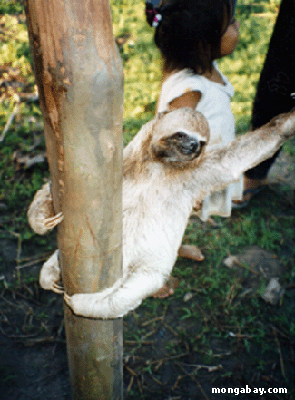 "Mongy, I am zzlow and I never go anywhere. I have never left zzis plaizze. You have zzeen the world and the world izz your home. It doezz not matter where you come from. It matterzz where you are right now! You have to live in the moment!" "Slowpoke is right, Mongy." I added. "All people who travel a lot eventually say that that they are citizens of the world. The world becomes their home. They don't feel the need to belong somewhere anymore. They can live anywhere and be happy." Mongy thought about this deeply. He sat there thinking and thinking. Finally, he jumped up like a lighting bolt and gave the Slowpoke and me quite a start. "I am Mongy the Bay Frog." he declared. "I love to be here right now and I love fish food cookies, too. I am a frog of the world and the world will be my home! (hop, hop, hop). I am here, now ( hop, hop, hop) ..... let's eat!" "No, I will take a loooong nap now. This day has been exhausting!" said Slowpoke and fell asleep instantly in front of a very puzzled Mongy, who couldn't imagine how someone could pass up a meal or sleep all day. Chapter 1: Meeting Mongy the Bay Frog Chapter 2: Mongy the Bay Frog's Family Chapter 3: Mongy the Bay Frog's meets Ringo the orangutan Chapter 4: Palm oil and rain forests Chapter 5: Mongy talks to a tree Chapter 6: Capture and escape! Chapter 7: In the Amazon Chapter 8: Butterflies |
 |
The Adventures of Mongy the Frog
|
|
|
|
worldrainforests.com/kids is published under a creative commons license.  
©2010 mongabay.com |
